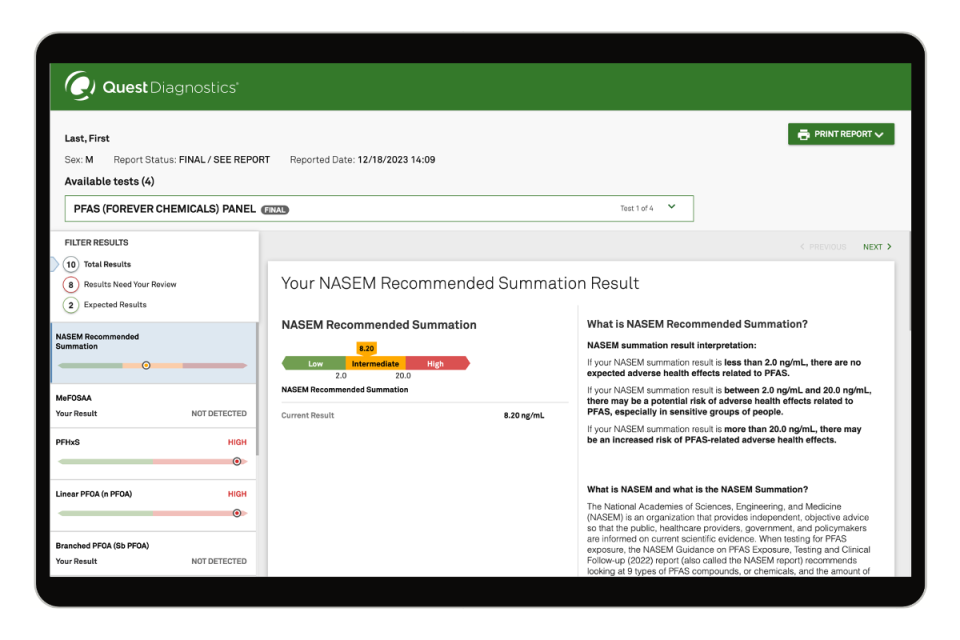New test could help Wisconsinites identify 'forever chemicals' in their blood
MADISON - Wisconsinites worried about "forever chemicals" now have a new way to test for levels in their blood.
Quest Diagnostics released a new test for about $300 that will survey blood for nine different compounds in the PFAS family of chemicals. The test will help to give those concerned about the health impacts of the chemicals more information about the levels in their blood and if they need to reduce their contact with them, said Dr. Jack Kain, a director of toxicology and a medical science liaison for Quest.
Patients need to find a Quest Patient Center and have blood drawn, then the serum portion of the blood is analyzed by technology to provide the most accurate readings possible.
"It's a confirmation," Kain said. "It's the most robust piece of equipment that we have out there to identify the substances that make their way into a patient's body."
The test provides a numerical value for the amount of one of the chemicals found in the blood. Those greater than 20 may have a higher risk of developing health issues, while lower values carry a lesser risk.
It's likely that most people have some level of PFAS in their blood, due to the sheer number of consumer goods that contain the chemicals and how easily they can get into water. While the amount of PFOA and PFOS in blood has been decreasing with the phase-out of the chemicals, there are still thousands more that could show up. PFOA and PFOS are two of the compounds the test will sample for.
The Centers for Disease Control and Prevention warns that testing for PFAS won't give you information about how the chemicals might impact you in the long term, such as predicting for the possibility of cancer, infertility or other issues. If there are concerning levels of PFAs in your blood, Kain recommended talking with a doctor about further testing for those issues.
"If you have a level greater than 20, in addition to reducing exposure, a clinician could consider other types of tests," he said.

Tests a doctor might consider include a lipid panel, thyroid function panels, tests for symptoms of kidney cancer, testicular cancer or ulcerative colitis.
The tests could serve to help researchers learn more about the impact of certain levels of PFAS in the body, said Dr. Roy Irving, hazard assessment section manager for DHS.
"My hope is that we will reach a point at some points similar to other environmental contaminants where there's more information that could be provided to individuals around what those PFAS levels mean. We're not there yet," he said.
Kain said the Quest tests make testing for PFAS more accessible and affordable for people who are concerned about the impacts of the chemicals, and especially for those in areas where high levels of contamination have been found.
"This stuff has been pumped into our environment for a long time. And we know it leads to these health conditions," he said. "Quest is taking a position to provide a test that's accessible and addresses the need of American communities who are being exposed to these toxic substances."
What are PFAS?
PFAS, or per- and polyfluoroalkyl substances, are a family of man-made chemicals used for their water- and stain-resistant qualities in products like clothing and carpet, nonstick cookware, packaging and firefighting foam.
The family includes 5,000 compounds, which are persistent, remaining both in the environment and human body over time. The chemicals have been linked to types of kidney and testicular cancers, lower birth weights, harm to immune and reproductive systems, altered hormone regulation and altered thyroid hormones.
The chemicals enter the human body largely through drinking water. PFAS have been found across Wisconsin in both surface water and drinking water sources.
Laura Schulte can be reached at [email protected] and on X at @SchulteLaura.
This article originally appeared on Milwaukee Journal Sentinel: New test measures the level of PFAS 'forever chemicals' in blood
